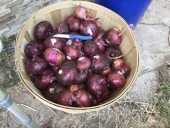It's that time of year.
It's always that time of year.
The time of year when you think of the perfect project to be starting at the exact OTHER time of year. "If only it were March now, I could do __ and __ and __!"
But it's not. It's October.
What's perfect about October? what are the top ten things I thought of doing in March that I later forgot about, or wrote down somewhere that I now can't remember? October gets cooler; has fewer sun hours per day; lower sun angle; less weed competition; less drought/overheating problems; less insect pressure; less human-detering mosquito pressure and pleasant ambiance for human work days…what else can we take advantage of about October that other months just don't have? (apologies for anyone south of the equator—you can post on this thread about April. "October is the kindest month" — Australian T. S. Eliot)
Here are some threads that talk about fall:
https://permies.com/t/17123/Fall-plantings-preparing-season -- Massachusetts author Eric Toensmeier weighs in. (It's Eeeeeric, it's the Ericinator. The Toensmaster.)
some info on planting pawpaws, and explanation of winter "scarification" and "stratification"
https://permies.com/t/71761/tree-shrub-seeds-sown-nursery
fall potatoes!?
https://permies.com/t/4806/Fall-planting-potatoes-zone
fall maple sugaring?! maybe sometimes a good idea is actually a bad idea…jury's out
https://permies.com/t/59098/Fall-Sugaring
Here's my list of things I've been doing this October (this is not to say these are good ideas, I'm still a beginner, sharing where I'm at; this is in zone 6, northeastern USA, urban):
—harvested pawpaws from nearby community garden (the tree's been there many years, an elderly gardener who no longer comes by much—they just pile up)
—harvesting acorns
—(in previous years) ordering fruit/nut trees for planting in November
—sawing some limbs off trees or coppicing some saplings that were shading planted walnuts and pears in my "zone 6" (land 200 miles from here that I get to only a few time a year), so they hopefully get a head start in the fall
—inventory of my carbon footprint (electric, gas, and transportation)
—built a "worm town" for the winter (Paul Wheaton's term—a 3 foot hole backfilled with plant matter and a 6" cap of garden soil on top—see his book for the whole description)
—making pokeberry ink (for a gift for someone obsessed with fountain pens)
—solar cooker cooking—the clearer air makes it much more effective, even with lower sun angle and shorter days—works through winter
—starting a new custom with chestnut gifts
—harvesting my potato (yes, that's right, only one potato came out of that thing.)
—harvesting green tomatoes
—spreading
compost and then mulching the garden bed, throwing our daikon radish seeds into the bed too to make some deeper soil in advance of spring
Yes, this thread is a shameless way of getting help with making a daily-ish—a pre-dailyish thread, if you will--but also I hope a useful meta-thread, a way of organizing a bunch of other fall-related threads or topics people know about so that people can find their way more directly to the right piece of information at the right time! I think this way of cross-referencing or organizing information can help beginners get oriented a bit more, if we don't have our families to teach us these things at the right time of year. Thanks for your thoughts!!

 2
2




 7
7




 5
5









 1
1




 3
3






















 1
1




 1
1





 2
2


















